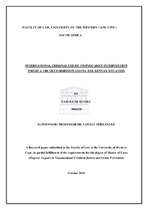| dc.contributor.advisor | Fernandez, Lovell | |
| dc.contributor.author | Kituku, Carolene | |
| dc.contributor.other | NULL | |
| dc.date.accessioned | 2014-03-28T08:44:08Z | |
| dc.date.available | 2013/03/20 | |
| dc.date.available | 2013/03/20 14:17 | |
| dc.date.available | 2014-03-28T08:44:08Z | |
| dc.date.issued | 2010 | |
| dc.identifier.uri | http://hdl.handle.net/11394/3060 | |
| dc.description | Magister Legum - LLM | en_US |
| dc.description.abstract | Kenya’s December 2007 Presidential elections sparked a wave of violent clashes over allegations of election rigging. The protests broke out along ethnic lines, causing greater civil unrest. There have been allegations that during these outbreaks of violence crimes against humanity were committed. This violence attracted world-wide concern and was universally condemned. Kenya is loathe to prosecute the perpetrators or those who bear the highest responsibility for the alleged commission of crimes against humanity. It has instead established a national investigatory mechanism, the Kenyan Truth, Justice and Reconciliation Commission (hereafter TJRC). This approach adopted by Kenya has been criticized for the fact that it fosters a culture of impunity. However, the Prosecutor of International Criminal Court (hereafter ICC) has used his proprio motu powers to initiate an investigation of alleged commission of crimes that fall within the jurisdiction of the Court. This research paper has analysed the reasons for the proprio motu intervention of the ICC in Kenyan situation. It also examined whether Kenya was unwilling or genuinely unable to prosecute the perpetrators of the post-election violence of 2007. Furthermore, the paper evaluated the provisions of the Kenyan TJRC, the major shortcomings of the Commission and the challenges it is facing in fulfilling its mandate. In conclusion the paper analysed the relationship between TJRC and ICC and re-evaluate any role that the two bodies could play in dispensing justice in Kenya. But before that, the paper laid down the factual background that led to the proprio motu interevention of the ICC in Kenya where a truth commission had alreday been established. | en_US |
| dc.language.iso | en | en_US |
| dc.publisher | University of the Western Cape | en_US |
| dc.subject | Admissibility | en_US |
| dc.subject | Crimes against humanity | en_US |
| dc.subject | International Criminal Court | en_US |
| dc.subject | International Criminal Court Prosecutor | en_US |
| dc.subject | Kenya | en_US |
| dc.subject | Perpetrators | en_US |
| dc.subject | Post election violence | en_US |
| dc.subject | Victims | en_US |
| dc.subject | Truth, Justice and Reconciliation Commission | en_US |
| dc.subject | Proprio motu | en_US |
| dc.title | International criminal court Proprio motu intervention where a truth commission exists: the Kenyan situation | en_US |
| dc.rights.holder | Copyright: University of the Western Cape | en_US |
| dc.description.country | South Africa | |

